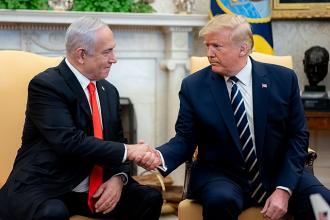Klal Yisroel were instructed not to wage war with Moav. Moav should have been relatively confident that they were not threatened by Klal Yisroel’s proximity to their borders. There are various interpretations of what caused Moav’s fear. Some say that they were afraid that they would become a vassal state. Other’s say that the Hashgocho arranged that Sichon conquered a major part of territory belonging to Moav. Through the halocho of kibush milchomoh, this then allowed Klal Yisroel to conquer it from Sichon. This made Bolok nervous that Klal Yisroel would take more territory from Moav and took measures to stop them.
They realized that open warfare against Klal Yisroel was futile. After seeing the two most powerful armies in the region utterly annihilated by Klal Yisroel, there was nothing to do militarily. If you cannot fight a military battle, the only recourse was to fight a spiritual battle. So, Bolok employed Billom to this end. He was certainly qualified because as Chazal say, his spiritual power and insight was on a level that rivaled Moshe Rabbeinu himself! With all that potential and greatness that Billom had, he winds up being killed on the battlefield at the hands of Klal Yisroel.
In the intial negotiating process, Bolok promises to give Billam great honor, but Billam is bargaining for more. He wants money. We learn from Chazal that Billam was so involved in arayos that he engaged an all forms of abominations. He was a paradoxical figure with the potential of Moshe Rabbeinu and obsessed with the drive of taivoh for money and arayos. He comes to curse Klal Yisroel.
The posuk describes Hashem’s encounter with Billam as one of keri—by happenstance, shrouded in the secrecy of night. Bolok takes Billam to view the edges of Klal Yisroel’s encampment, to see the fringe elements and focus on their shortcomings with the hope that he can find a spiritual vulnerability. But Billam says it won’t work. He sees the spiritual roots of Klal Yisroel are too strong and solid. Their forefathers implanted certain spiritual potential and power in their offspring so that even when they falter and succumb to temptation, it is only a temporary setback. It doesn’t reflect their essence. There is something that remains pure and untainted in their neshomo by which they can restore their true selves.
We are a nation that dwells alone. Our greatness comes from our separateness. Because of this, we will ultimately have the purity that will dominate the world. Because of this, Klal Yisroel cannot be reckoned with as one does with any of the nations.
Finally, Billam concludes that he yearns for the olom habboh of the yeshorim. With this statement, Billam reveals his acute awareness of the deep paradox he is living. On the one hand, he is totally engulfed by taivoh and cannot resist the passions of the moment. Yet he realizes that by living for the moment, he is forfeiting the reward that could have been his had he lived up to his enormous spiritual potential. What a tragic figure Billam is. He fully understands the reality that his desire for money and arayos is forcing a tradeoff with his olom habboh. But he can’t hold himself back. He trades in the long term, eternal rewards of tomorrow for the thrills and pleasures of today.
Chazal tell us that Hashem gave Billam his unbelievable spiritual powers in order to counter an excuse that the nations of the world could have made for their failure. They could have argued that Klal Yisroel aren’t really special or deserving of being chosen by Hashem. It is only because they had a leader like Moshe Rabbeinu that they were worthy. If we had a prophet like Moshe Rabbeinu, we would become equally worthy. So Hashem gave them Billam.
So the question is, why did only Moshe Rabbeinu emerge as the Ish Ho’elokim, the most perfect human being and not Billam? The answer lies in what Billam himself perceived about Klal Yisroel’s specialness when he looked down on them from above. Klal Yisroel, and Moshe Rabbeinu among them, conduct themselves with tznius. They are like a running stream which develops into tents and powerful cedar trees. Chazal explain the metaphor of a running stream is a reference to the purity of a mikveh plus. It can take a human being and transform his body from tumah to taharoh. So too the learning of Torah can transform a person’s neshomoh from tumoh to taharoh.
It is the source for the Rambam I’ve quoted many times.
When a person totally immerses himself in a mikveh without any separation, the mikveh has the capacity to change his body from tum’oh to taharoh. So too, a person who immerses himself in the pure waters of knowledge also transforms his neshomoh from tum’oh to taharoh. What is tum’as hanefesh? Bad middos and hashkofos become good middos and good hashkofos. Torah has the capacity to transform the entire human being. But you have to immerse yourself in Torah. You need an intent that Torah will make you pure. But you must start with tznius.
A person has to decide that he wants the Torah to impact his day-to-day life and thought patterns. Most people don’t want the Torah to change them on a fundamental level. But that’s not Torah.
The Rambam in Moreh Nevuchim that the goal of the Torah is to change a person.
I have a dispute with the members of my shul who instituted a seder in the Sefer Shemiras Haloshon every Shabbos. Why did I object? Because I realized that this limud wasn’t changing anyone. The shul is rife with machlokes to an unbelievable degree. You don’t learn something if it doesn’t change you. It’s not an intellectual exercise. The purpose of learning is to emerge with a taharas hanefesh. You must emerge with different goals, different attitudes.
People complain that when bochurim come to learn in yeshivah in Israel, they don’t come back the same way they left. I don’t understand the criticism. They came to learn Torah, and the Torah deeply affected their goals and their attitudes. That’s what is supposed to happen! If the Torah you learn didn’t change you, then you didn’t learn Torah.
People come into yeshivah with certain ideas, emotions and attitudes. Where did they come from? Typically they came from the street, from the lowest common denominator of western culture. Torah is supposed to uplift a person and give you loftier values, goals and aspirations.
Billam articulated that Klal Yisroel is blessed with the middoh of tznius. The middoh of tznius is the antithesis of the modern culture we live in today. The lack of tznius we find in society today has a number of different facets. One facet is an obsessive preoccupation with zenus. People have come to define themselves by their orientation. This preoccupation destroys a person and society.
Tzinus presents us with a radically different picture of what a human being is. A person is much more than his physical body. Acting in a way that lacks of tznius is broadcasting to the world that my worth and my value are measured only in terms of how good I look and how much attention I can get from others. It dehumanizes us. Tznius says I present myself as a human being whose value lies in the neshomo and the body is only there to serve the neshomo.
Billam gazed at Klal Yisroel and declared that he would prefer to get the olom haboh of tzaddikim, but he can’t. He is immersed in taivoh and he is obsessed with taivoh. Even though he has all the spiritual powers of a Moshe Rabbeinu, his preoccupation with taivoh is so great that he can’t give up the pleasures of the moment.
Klal Yisroel are different. They have spiritual powers so deep that they are a fundamentally different type of human being. Because of their forefathers, they have an ability to live a life of tzenius and kedusha and immerse themselves in the tent of Torah. It’s a whole different world and a whole different way of living.
Billam says the Jews are like lions arising. When a Jew wakes up in the morning, he immediately has to think to say the words of Modeh Ani and wash his hands. Chazal are telling us something very powerful with this takkono. They are telling us that the very first thing that a Jew does when he regains consciousness every morning is that he is an eved Hashem. He is submitting his first waking moments of his day to avodas Hashem. Imagine a goy or non-frum Jew waking up in the morning, the last thing on his mind is Hashem and anything to do with spirituality.
Finally, Billam prophesizes about the distant future and the days of Moshiach. He says Klal Yisroel’s security comes from our isolation from the nations of the world. Our ideas are different, our goals and values are different, our culture and preoccupation is different. We are Hashem’s nation.
Immediately afterward we have the incident with the Bnos Moav. This strategy naturally came from Billam in order to destroy Klal Yisroel. But Billam just retold all the praises of Klal Yisroel in the most laudatory, exemplary terms! It didn’t matter. Although Billam could have a deep perception of the greatness of Klal Yisroel, he hated them and hated all that they stood for and wanted it destroyed. He couldn’t accept the fact of “mah tovu.” He couldn’t accept the fact that Kla Yisroel were living on a higher level while he was sunk in taivoh. He couldn’t accept the fact that because he routinely gave into the temptations of the moment, he was giving up his olom habboh. So he has to pull Klal Yisroel down into his way of life of taivoh and avodo zoro. It was a deep-seated resentment of those who keep a higher standard. All ba’alei taivoh find it difficult to tolerate tzaddikim. They resent them.
One of the things we have to take out of the parsha is the deeply tragic figure of Billam who knows his great potential, but can’t rise above his taivoh and his ego. He appreciates the greatness of Klal Yisroel because of their tznius and their presenting their self-image as a tzelem Elokim to become a different type of human being. They are not pulled in by all of the filth of the world around us.
This is what a yeshivah is about. Not to come for a year and go back saying what a good time you had in Israel. It is a place where you are coming intentionally to change yourself and become a different human being. To immerse yourself in Torah and allow it to change your attitudes, your values and your middos. Everything. To use your closeness to Torah as a way of molding and shaping yourself.
The western world has this mistaken notion of people trying to discover themselves. But there is no such “self” inside of you that you are trying to discover and explore. There is Torah and you make yourself what you want to become by your decisions and your influences. You use the Torah to make yourself a better person.
Every one of us has a range of traits and tendencies which are inside us. Some are good and some are bad. Some should be directly enhanced and some should be suppressed and then carefully sublimated into positive expression. How do we know which of our traits are good and which ones are bad and how to develop them in the right direction? The Torah tells us what they are and how to build ourselves. The more Torah you know, and the more immersed you are in Torah, the closer you are to Hashem and the more you can change yourself to become a Torah individual.
What is a Ben Torah? For me, a Ben Torah is someone who wants to define every aspect of life and his personality through the Torah’s value system. His whole outlook on the world has to come from the Torah. That requires a total immersion and a kavono for taharoh.
And Billam added one more prerequisite: tznius. For as long as a person’s mind is preoccupied with zenus, like the entire western world is, you can’t be totally immersed in learning Torah and you can’t change yourself. The reason to remain tzanuah and keep your mind away from zenus is because you want the Torah to change you.
We learn Torah for one purpose: to change ourselves and emerge as superior human beings.
















